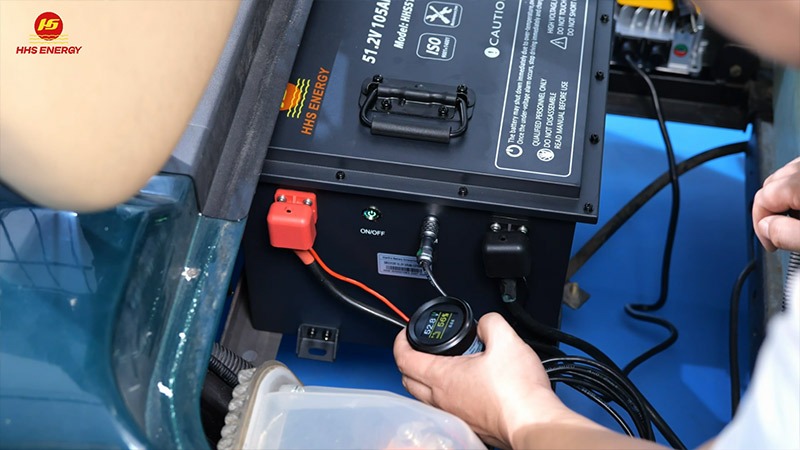Yes, you can put lithium batteries in most golf carts, but there are a few important considerations and modifications to ensure compatibility and safety:

Key Considerations:
- Voltage Compatibility:
Ensure the lithium battery pack matches the voltage requirements of your golf cart. Common golf cart systems are 36V , 48V or 72V. Lithium batteries are typically available in configurations that can replace traditional lead-acid systems.
- Battery Management System (BMS):
Lithium batteries come with a built-in BMS to prevent overcharging, undercharging, and overheating. Check that the BMS is compatible with your golf cart’s existing charging and electrical system.
- Charger Compatibility:
Lithium batteries require a specific charger. Using a charger designed for lead-acid batteries can damage lithium batteries. Most lithium battery manufacturers provide compatible chargers or recommend suitable options.
- Space and Weight Adjustments:
Lithium batteries are lighter and smaller than lead-acid batteries. This weight reduction benefits performance, but you may need spacers or brackets to secure them properly in the battery compartment.
- Wiring and Connection:
Lithium batteries are typically connected in parallel, unlike lead-acid batteries which may be connected in series. Ensure proper wiring to maintain voltage and capacity.
Benefits of Switching to Lithium Batteries:
- Longer Lifespan: Lithium batteries can last 8–10 years or more, compared to 3–5 years for lead-acid.
- No Maintenance: Lithium batteries don’t require water refills or corrosion cleanup.
- Lighter Weight: Reduces cart weight, improving efficiency and extending range.
- Faster Charging: Lithium batteries charge faster than lead-acid, often reaching 80% capacity in a few hours.
- Consistent Performance: They deliver consistent voltage, ensuring better torque and power throughout the charge cycle.
Challenges and Limitations:
- Higher Upfront Cost: Lithium batteries cost more initially compared to lead-acid batteries.
- Compatibility Modifications: Upgrades like a new charger and minor electrical adjustments may be needed.
- Not Ideal for Extreme Cold: Lithium batteries can struggle in sub-freezing temperatures unless equipped with a built-in heating element.
Conclusion:
Lithium batteries are a great upgrade for most golf carts, offering improved performance, efficiency, and lifespan. However, to ensure safe and effective use, check your golf cart’s voltage, purchase compatible lithium batteries with a proper BMS, and use a recommended charger.
If unsure, consult with the battery manufacturer or a professional technician before making the switch.
